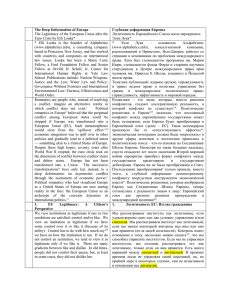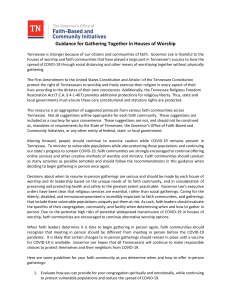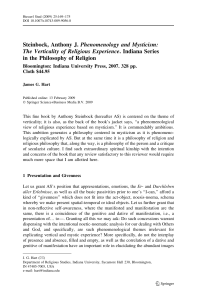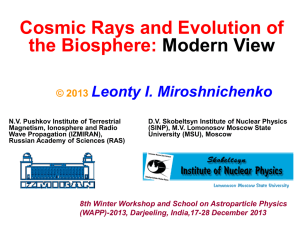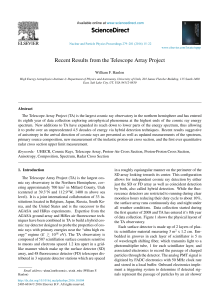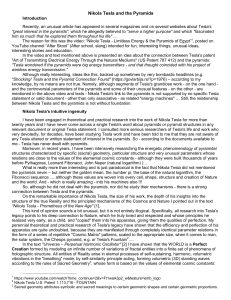вера в разум и его культ - Fermi Society of Philosophy
реклама
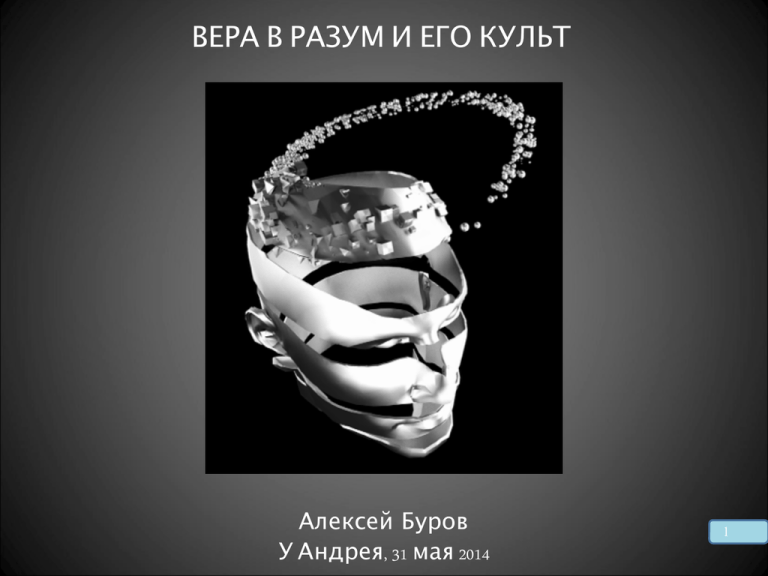
ВЕРА В РАЗУМ И ЕГО КУЛЬТ Алексей Буров У Андрея, 31 мая 2014 1 Вера фундаментальной науки 1 Faith and Reason Three approaches to the problem: Reason => Faith ? (Platonism, Natural Theology, Scientific Atheism) Reason || Faith (Complete separation) Reason and faith are vital for each other. Einstein: Faith without reason is blind; reason without faith is lame. ! Thus, according to Einstein, reason is empowered by faith, while faith has to be seen and tested by reason: ! ! ! Faith awareness correction birth Reason power Let’s see how does it work for fundamental science. What faith empowered it? Is anything to be corrected in that faith? 3 Cosmic Religious Feeling “ . . . я утверждаю , что космическое религиозное чувство является сильнейшей и благороднейшей из пружин научного исследования. Только те, кто сможет по достоинству оценить чудовищные усилия и , кроме того , самоотверженность , без которых не могла бы появиться ни одна научная работа , открывающая новые пути , сумеют понять, каким сильным должно быть чувство, способное само по себе вызвать к жизни работу, столь далекую от обычной практической жизни. Какой глубокой уверенностью в рациональном устройстве мира и какой жаждой познания даже мельчайших отблесков рациональности, проявляющейся в этом мире, должны были обладать Кеплер и Ньютон , если она позволила им затратить многие годы упорного труда на распутывание основных принципов небесной механики! 4 Cosmic Religious Feeling “I maintain that the cosmic religious feeling is the strongest and noblest motive for scientific research. Only those who realize the immense efforts and, above all, the devotion without which pioneer work in theoretical science cannot be achieved, are able to grasp the strength of the emotion out of which alone such work, remote as it is from the immediate realities of life, can issue. What a deep conviction of the rationality of the universe and what a yearning to understand, were it but a feeble reflection of the mind revealed in this world, Kepler and Newton must have had to enable them to spend years of solitary labor in disentangling the principles of celestial mechanics! 5 Cosmic Religious Feeling Тем же, кто судит о научном исследовании главным образом по его результатам , нетрудно составить совершенно неверное представление о духовном мире людей, которые , находясь в скептически относящемся к ним окружении , сумели указать путь своим единомышленникам , рассеянным по всем землям и странам. Только тот, кто сам посвятил свою жизнь аналогичным целям , сумеет понять , что вдохновляет таких людей и дает им силы сохранять верность поставленной перед собой цели , несмотря на бесчисленные неудачи. Люди такого склада черпают силу в космическом религиозном чувстве. Один из наших современников сказал, и не без основания, что в наш материалистический век серьезными учеными могут быть только глубоко религиозные люди.” A. Einstein, Religion and Science, 1930. 6 Cosmic Religious Feeling Those whose acquaintance with scientific research is derived chiefly from its practical results easily develop a completely false notion of the mentality of the men who, surrounded by a skeptical world, have shown the way to kindred spirits scattered wide through the world and through the centuries. Only one who has devoted his life to similar ends can have a vivid realization of what has inspired these men and given them the strength to remain true to their purpose in spite of countless failures. It is cosmic religious feeling that gives a man such strength. A contemporary has said, not unjustly, that in this materialistic age of ours the serious scientific workers are the only profoundly religious people.” A. Einstein, Religion and Science, 1930. 7 Duty and Prophesy We must know. We will know. ! D. Hilbert, Retirement Address, 1930 8 Martyrdom 1633: For his “Dialogue”, Inquisition sentenced Galileo to home arrest, continued until the end of his life, 9 years. All his writings were banned from publication. He lived in his villa in Arcetri, near Florence. Visiting Florence was strictly forbidden for him. He starts working on a book which became his main masterpiece: “Two New Sciences”. ! 1638: His health was getting worse; he became completely blind. A permission to travel Florence for medical advises was given. Meanwhile, “Two New Sciences” was published in Holland. As a result, the permission to visit Florence was revoked just after a few months after it was given. ! Until his death at 1642: Complete home arrest. Galilei (1564-1642) 9 Mys9c Experience “If you are receptive and humble, mathematics will lead you by the hand. Again and again, when I have been at a loss how to proceed, I have just had to wait until I have felt the mathematics lead me by the hand. It has lead me along an unexpected path, a path where new vistas open up, a path leading to new territory, where one can set up a base of operations, from which one can survey the surroundings and plan future progress.” ! P.A.M. Dirac, unpublished note, 1975. 10 What is a Creed of this faith? Fundamental Physics (FP) is a long-term human enterprise; starting from Pythagoras, a father of theory, it is about 2500 years old. Fathers of science of various epochs expressed their faith. Let’s hear them, try to understand them and see a source of their inspiration and power of their devotion. ! Let’s think and try to formulate universal metaphysical premises of this faith. ! Thus, in our research of the scientific faith we will proceed both historically and logically. 11 Thales (c.624-­‐546), Anaximander (c.610-­‐546) There is a unity of everything existing Water Apeiron (unbounded) 12 Pythagoras Πυθαγόρας, c. 570-495 Legendary figure. “The teacher said so”. Stobaeus: “Things that were alike and of the same kind had no need of harmony, but those that were unlike and not of the same kind and of unequal order – it was necessary for such things to have been locked together by harmony, if they are to be held together in an ordered universe.” P. introduced: “Harmony”, “Cosmos” (ordered by harmony), “Theory” (theorein, contemplate), “philosophy”, “mathematics” (learning). ! Theory as the way of salvation from the wheel of life. 13 Бертран Рассел о Пифагоре Влияние геометрии на философию и научный метод было глубоким. Геометрия в таком виде, в каком она установилась у греков , отправляется от аксиом , которые являются самоочевидными (или полагаются таковыми), и через дедуктивные рассуждения приходит к теоремам, которые весьма далеки от самоочевидности… Подобная точка зрения оказала влияние как на Платона и Канта, так и на многих других философов, стоявших между ними. Когда Декларация независимости говорит: "Мы утверждаем, что эти истины самоочевидны " , – она следует образцу Евклида . Распространенная в XVIII веке, доктрина о естественных правах человека является поиском евклидовых аксиом в области политики… Форма ньютоновского произведения "Начала", несмотря на его общепризнанный эмпирический материал , целиком определяется влиянием Евклида. Теология в своих наиболее точных схоластических формах обязана своим стилем тому же источнику. Личная религия ведет свое начало от экстаза, теология – из математики; и то и другое можно найти у Пифагора. Я полагаю, что математика является главным источником веры в вечную и точную истину , как и в сверхчувственный интеллигибельный мир … Мистические доктрины по поводу соотношения времени и вечности также получают поддержку от чистой математики, ибо математические объекты, например числа (если они вообще реальны), являются вечными и вневременными. А подобные вечные объекты могут в свою очередь быть истолкованы как мысли Бога. 14 ! Бертран Рассел о Пифагоре Начавшееся с Пифагора сочетание математики и теологии характерно для религиозной философии Греции, средневековья и Нового времени вплоть до Канта. До Пифагора орфизм был аналогичен азиатским мистическим религиям. Но для Платона, св. Августина, Фомы Аквинского, Декарта, Спинозы и Канта характерно тесное сочетание религии и рассуждения, морального вдохновения и логического восхищения тем , что является вневременным, – сочетание, которое начинается с Пифагора и которое отличает интеллектуализированную теологию Европы от более откровенного мистицизма Азии.. ! И я не знаю другого человека, который был бы столь влиятельным в области мышления , как Пифагор. Я говорю так потому , что кажущееся платонизмом оказывается при ближайшем анализе в сущности пифагореизмом. С Пифагора начинается вся концепция вечного мира, доступного интеллекту и недоступного чувствам. Если бы не он, то христиане не учили бы о Христе как о Слове; если бы не он, теологи не искали бы логических доказательств бытия Бога и бессмертия. 15 B. Russel on Pythagoras The combination of mathematics and theology, which began with Pythagoras, characterized religious philosophy in Greece, in the Middle Ages, and in modern times down to Kant. Orphism before Pythagoras was analogous to Asiatic mystery religions. But in Plato, St Augustine, Thomas Aquinas, Descartes, Spinoza, and Leibniz there is an intimate blending of religion and reasoning, of moral aspiration with logical admiration of what is timeless, which comes from Pythagoras, and distinguishes the intellectualized theology of Europe from the more straightforward mysticism of Asia… I do not know of any other man who has been as influential as he was in the sphere of thought. I say this because what appears as Platonism is, when analysed, found to be in essence Pythagoreanism. The whole conception of an eternal world, revealed to the intellect but not to the senses, is derived from him. But for him, Christians would not have thought of Christ as the Word; but for him, theologians would not have sought logical proofs of God and immortality. 16 Plato, Euclid Plato teachings on forms and salvation follow Pythagorean philosophy. ! Platonic myth about creation of World and Man (“Timaeus”) is close to the Book of Genesis in several essential aspects: - Monotheism - Void as a substance of World - Humans are created in God similarity Πλάτων, 428-348 Euclidian geometry had nothing to do with practical needs; it was neither motivated by them nor added a single practically important result to what was well-known already for centuries in Egypt and Babylon. The goal of Euclid was purely spiritual: to see the divine reality of Logos/Harmony/forms, hidden under a veil of phenomena. “Give him three obols and let go” Εὐκλείδης, c. 300 BC1 (Florence, Bell Tower, XIVc.) 17 Aristotle (384-­‐322) World=forms+matter ! World is rational and purposeful, led by Mind (Nous) to Good ! Human nous is an only part of the souls coming directly from God, not from parents; it is a specific human gift, turning humans to be similar to God. Since the specific purpose for humans is to think, the best human life is a thinker, philosopher. 18 Мои статьи на тему “Вера и Разум”: http://www.snob.ru/profile/27355/blog ! Вера в разум и его культ Человек глазами науки Метафизика Космогенеза Генезис космического наблюдателя Природа законов природы 19 Спасибо за внимание, и продолжение следует. 20
